Remembering Sue Davis: Comrade, fighter, writer (1942-2020)
Workers World Party lost a dynamic, dedicated comrade on Sept. 26 when Sue Davis died, a month after suffering a major stroke. A member of the party since 1967, Sue had early on been a militant activist on the streets with Youth Against War and Fascism, the party’s youth group, protesting the U.S. war against Vietnam and supporting the Black Panther Party against government repression. She was also a staunch fighter for women’s, workers’ and LGBTQ2S+ rights.
Sue was an opponent of capitalism, the root cause of oppression, war and poverty, and advocated for socialism for 53 years, alongside her comrades.
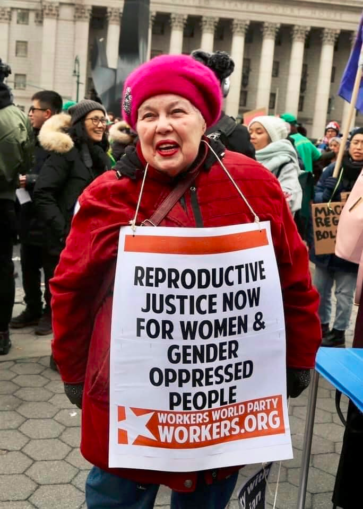
Sue Davis and WWP members participated in the Jan. 18, 2020, Women’s March in Foley Square in New York City.
Larry Holmes, WWP’s First Secretary, says of her that “Comrade Sue was so remarkable and formidable that she could have chosen any path for her life and succeeded. But she chose to be a revolutionary socialist fighter, and dedicated her entire life to the struggle of the workers and the oppressed. She was a model for anyone, regardless of their generation, who makes the hard decisions to give their life to the struggle for socialist revolution.”
No U.S. war in Vietnam!
After joining YAWF, Sue, along with other members, participated in “Stop the Draft Week” marches in December 1967 in downtown New York City. Wearing a helmet, she participated in many protests against Washington’s war in Vietnam in the late 1960s and early 1970s, chanting “Big firms get rich, GIs die.”
Sue reached out to women’s groups and helped mobilize for the historic women-led march of Oct. 12, 1969, on Fort Dix in New Jersey, supporting anti-war GIs in the stockade there. YAWF organizer Laurie Fierstein was a coordinator of that bold action. That year, Sue was added as a technical editor on The Bond, newspaper of the American Servicemen’s Union.
For decades, Sue made major contributions in the movement for women’s rights, especially for reproductive justice, by her activism and her writing. Sue was instrumental in initiating the Women’s Caucus of YAWF in 1969 and co-edited Battle Acts, the organization’s magazine, published from 1970 to 1974.
This publication covered news and struggles of working-class women, especially low-income and Black, Latinx, Asian and Indigenous, immigrants and those with disabilities, LGBTQ2S+ individuals, prisoners, youth and seniors. Articles supported the Black Panther Party and other liberation movements at home and abroad.
The magazine’s international features expressed solidarity with the women of Vietnam, under siege from Washington’s bombs and Agent Orange, and the women of South Africa resisting racist apartheid. Articles sided with our sisters in socialist Cuba subjected to a U.S. blockade, and hailed Puerto Rican independence fighters, such as Lolita Lebron. (Go to tinyurl.com/y37k2dp2 to read back issues.)
YAWF Women promoted the need for struggle and solidarity with the most oppressed women, shown in its banner “Sisters: Unite and Fight!” that was carried in demonstrations around the country.
International Women’s Day: 1970
On March 7, 1970, the YAWF Women’s Caucus organized a 1,000-strong march for International Women’s Day to the notorious Women’s House of Detention in NYC’s Greenwich Village, in solidarity with oppressed women imprisoned inside. As the demonstrators chanted “Free our sisters!” the women inside yelled out the windows “Power to the people!”
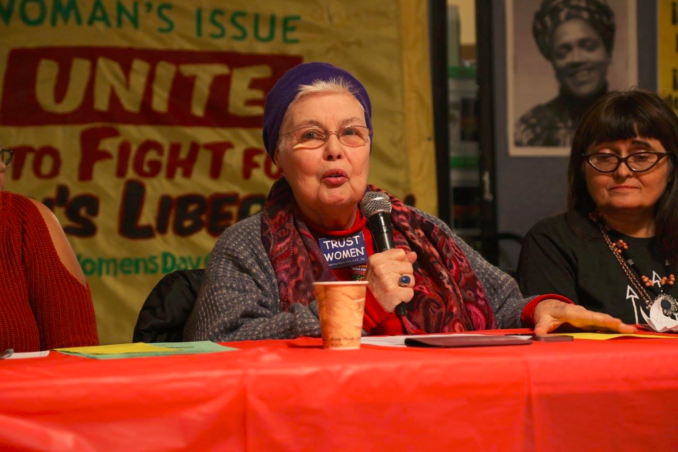
Sue Davis (center) and Stephanie Hedgecoke on an International Working Women’s Day panel, March 12, 2017.
Sue was instrumental in this mobilization. One way she contributed was to research the march route taken on March 8, 1908, by 15,000 immigrant garment workers demanding higher pay and an end to sweatshops and child labor. That demonstration had been an impetus for women socialists in Europe to establish International Women’s Day in 1910.
YAWF Women reclaimed the militant, socialist character of this special day by following the route taken in 1908, while highlighting the struggles of the most oppressed women in the first such protest in the U.S. in decades.
A fighter for workers’ rights, Sue attempted to unionize staff at publishing company McGraw-Hill. In April 1970, she was fired by the bosses, who opposed not only her pro-worker activism, but her workplace organizing against the Vietnam War and support for the Black Panther Party. The group Women in Publishing and other workers in the industry picketed the company’s building, calling for Sue’s rehiring and denouncing this political repression.
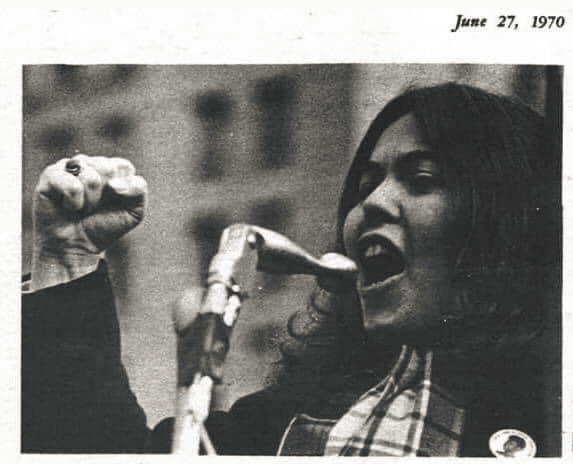
Sue Davis speaks at a June 27, 1970, protest after being fired by publisher McGraw-Hill for her pro-union and political organizing.
In 1987, Sue joined the National Writers Union and had played a leadership role for the last 20 years centered on dealing with grievances and contracts. She also mentored NWU volunteers on how to work on behalf of the members. She strongly urged the NWU to take a significant role in supporting political prisoner Mumia Abu-Jamal. The union’s wonderful tribute to Sue appears on the NWU website and was emailed to its members (tinyurl.com/yy3vw8sy).
Reproductive justice now!
YAWF Women and WWP participated in the mass movement demanding legal abortion since its beginning. The right was finally won from the Supreme Court in 1973. Sue made fighting for reproductive justice — and writing about it in WW newspaper and other publications — a special focus for decades. In addition to her activism and writing, Sue was involved in defending women’s clinics to protect workers and clients from the vile right-wingers attacking them.
A YAWF Women’s banner was carried to every demonstration on reproductive rights. Its slogan, unique in that period, read: “Free, safe legal abortions! No forced sterilization! Raising healthy children: The choice must be ours!” This was always the pro-working class, anti-racist viewpoint espoused by YAWF and WWP on reproductive rights, explained in a brochure entitled, “Abortion and Class Society.” Composed by Sue and this writer, it was updated frequently as the struggle developed into a multi-issue movement, speaking to the needs of all women.
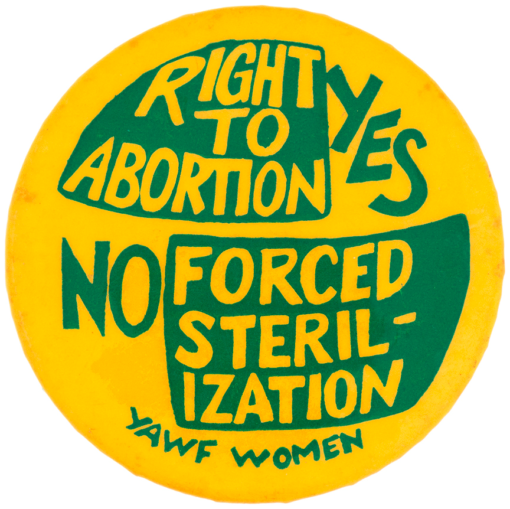
YAWF Women urged expanding the call for the “right to abortion” to a more inclusive demand for “reproductive justice.”
Representing YAWF Women, Sue became very active in the Committee to End Sterilization Abuse, founded in the early 1970s by Dr. Helen Rodriguez Trias. The organization, which included the American Indian Movement and the Third World Women’s Alliance, campaigned against the rampant coercive sterilization of women in Puerto Rico and of Black, Latinx, Indigenous and poor women in the U.S. The group successfully won regulations barring this racist practice and mandating informed consent, first in New York City in 1975-77 and then federally in 1979.
Anne Teicher, Sue’s friend and collaborator, told WW that they both were members of the Steering Committee of the Committee for Abortion Rights and Against Sterilization Abuse (CARASA), formed in 1977 to oppose the Hyde Amendment and the barring of Medicaid funding for abortions. The group was active through the 1980s.
In the late 1980s, Sue and Anne wrote a pamphlet on sterilization abuse. Sue also edited a CARASA book, which was reissued as “Women Under Attack: Victories, Backlash and the Fight for Reproductive Freedom.”
“Sue was a tireless advocate, organizing demonstrations, writing newsletter articles and tabling on the streets,” explained Anne.
Sue was active with YAWF Women in protests initiated by the Joanne Little Defense Committee, which the Norfolk, Va., branch of WWP helped to found, along with the Prisoners Solidarity Committee. Little, who is African American, defended herself against a white deputy sheriff who attempted to rape her in a prison in Beaufort, N.C., in 1975. She was tried for murder and faced life in jail or execution, but a national campaign won her acquittal and release.
Support Workers World newspaper!
Sue’s dedication to WW newspaper went back to the 1970s, when the staff worked (pre-computer) at the office until the wee hours of the morning, went home, slept for a few hours, and then went to their day jobs. For over four decades, Sue wrote, proofread and copyedited, using her professional expertise for the working-class weekly. She covered labor activism in her biweekly column in WW newspaper, On the Picket Line.
Monica Moorehead, a WW managing editor and coordinator of the International Working Women’s Day Coalition in NYC, said: “Sue Davis was an indispensable member of our editorial staff, a brilliant copy editor who paid so much attention to both political and grammatical detail. Her articles on labor and women’s issues helped to raise the sensitivity and political level of our readers.
“Sue helped to found our IWWDC in the early 2000s, when she would speak at our rallies and forums on reproductive justice which she spent many decades of her life defending and fighting for. She was always expanding her political understanding where gender oppression was concerned. The working class movement has truly lost a precious revolutionary whose spirit can never, ever be duplicated and I have lost a dear friend and comrade.”
Because of her firm commitment to the newspaper, Sue single-handedly initiated and carried out the WW Supporter Program for 43 years, sending out a monthly letter, which included a personalized hand-written note to each donor. That’s about 35,000 letters! She cultivated friendships and regularly kept in touch with many supporters .
Sue’s work raised funds that helped to publish and mail out the publication. She was elated when supporters donated. Sue was so dedicated to WW newspaper that she prioritized donating as generously as she could every month to publish it — like clockwork.
Sue had friends from many milieus, even going back to her high school and college days, who had vastly different political viewpoints and philosophies. Yet she maintained her anti-racist, pro-worker and pro-socialist perspective. Sue led a full life, contributing to many struggles, diligently working on WW newspaper, and even writing a novel, while enjoying New York’s cultural events and treasuring her family, friends and comrades.
Sue Davis, Presente!
Here are other personal and political recollections of Sue.
Ellen Catalinotto, New York City
I have a vivid memory of Stop the Draft Week, December 1967, when Sue and I held hands as we marched many miles from the Whitehall Street recruiting center near Battery Park to midtown Manhattan, dodging police along the way and taking refuge on the ground floor of the Metropolitan Life Insurance Company, where I later worked.
John Catalinotto, New York City
A photo of Sue Davis and Deirdre Griswold marching in an anti-war protest in May 1968, Sue wearing a helmet, made the cover of “The Vietnam Songbook,” published in 1969. She also copy edited the entire book “Turn the Guns Around: Mutinies, Soldier Revolts and Revolutions,” about the American Servicemen’s Union, published in 2017.
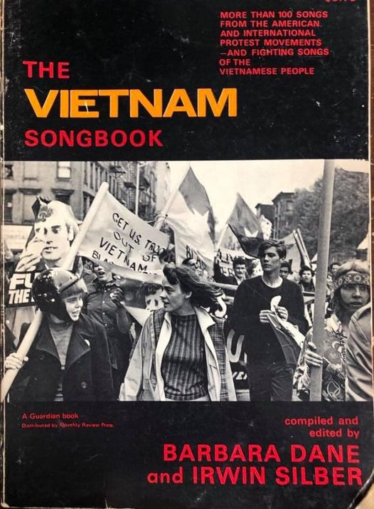
Sue Davis (in helmet) and Deirdre Griswold (right) at a 1968 demonstration against the Vietnam War in New York City.
Ed Childs, Boston
In Sue Davis we have lost a great soldier. I remember Sue in the uniform Stephanie talked about. I was looking forward to following Sue in these new struggles coming. I will miss her strength, hard-hitting writing and understanding of struggles within our working class ranks. Tiocfaidh Ár lá.
Ellie Dorritie, Buffalo, N.Y.
Sue was with the wonderful comrades who came to Buffalo during the “Spring of Lies” [demonstrations in 1992 against the anti-abortion group “Operation Rescue” and its “Spring of Life” campaign]. WWP cadre, together with hundreds of furious women and their LGBTQ and other allies, booted the anti-woman bigots out of Buffalo every day.
I will forever miss Sue’s passionate, joyful congratulation emails every single time something – even the smallest thing – great happened with the Buffalo branch: a meeting, a class, a demonstration no matter how small, and, oh! a new comrade! That got an outpouring of praise. Sue sent a long, newsy handwritten letter to me on the back of the monthly letter every Supporter got. We would go back and forth a few times until the next month’s letter arrived. Sometimes our correspondence was funny, other times we shared the private fears of aging. We were the same age, within a few weeks, so we’d send birthday cards back and forth in August.
Kathy Durkin, New York City
Not only was Sue a writer and copy editor par excellence, she was first of all an activist. There was not a march or picket line that Sue didn’t attend unless she could not. Sue loved the struggle, which led her to participate in and write about so many, especially those involving women and workers. She was reliable, loyal to WW and a very hard worker. She was a force of nature and got things done!
Sue was my comrade, sister and friend. Once, she told me she had to discuss a “problem” with my writing. I asked what it was. She replied, “You use too many commas!”
Phebe Eckfeldt, Boston
Sue attended reproductive justice conferences in Western Massachusetts for many years, bringing literature and doing outreach. Last year we produced a pamphlet containing writings by women and LGBTQ people published in WW, entitled “Every Struggle Is a Woman’s Struggle.” We sold copies of the pamphlet there, and copies of Sue’s novel, “Love Means Second Chances.” At one conference, people were invited to share their experiences with abortion, not easy to do. Despite being nervous, Sue spoke and did a great job.
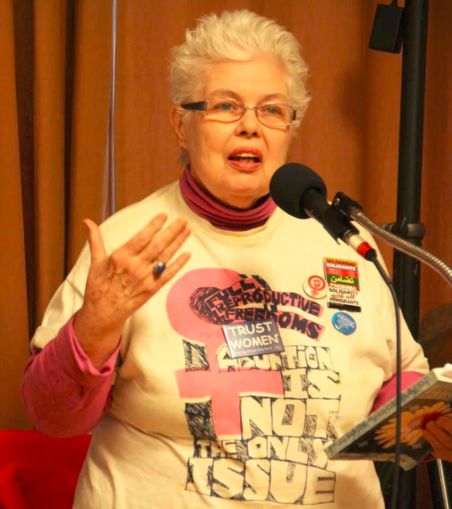
Sue Davis introduces her novel, “Love Means Second Chances,” at a reading.
This reminds me of Sue: “My mission in life is not merely to survive, but to thrive; and to do so with some passion, some compassion, some humor and some style.” — Maya Angelou
Sharon Eolis, New York City
I knew Sue Davis for over 50 years. We were comrades and close friends. She was a staunch fighter for women’s rights within the Party and in the broader women’s movement. In the early 1970s, the YAWF Women’s Caucus, which worked within WWP, put out a magazine called Battle Acts. Sue was one of its editors and writers. We worked together on Battle Acts, and continued to work together on women’s issues and many other issues over the years.
Liza Green, Boston
Sue Davis dedicated her novel, “Love Means Second Chances,” to “women everywhere,” and wrote “Let us change the world so that our lives are no longer defined by the patriarchy, and future generations can live with equality and justice, love and joy, peace and plenty as their birthright.” She lived every aspect of her life with this goal as its basis. I will miss her kind, personal and sometimes humorous handwritten notes in WW Supporter Program messages every month but will also deeply miss her well-researched articles on the pages of WW newspaper.
Deirdre Griswold, Manchester, Conn.
Sue Davis wore many hats. One was the helmet she donned for demonstrations that could come under attack by cops or fascists. They’d better not mess with her! She was also a skilled copy editor on Workers World newspaper, reading into the wee hours for content as well as style. She made herself knowledgeable about what was going on in the labor movement, boiling it down for our readers in her weekly column, “On the Picket Line.”
In addition, she was an advocate and compassionate helper for many women desperate for reproductive justice. And yes, she was an outlaw — getting around the laws that keep people, especially women, in chains. Without struggle, there is no justice. This sweet, brave woman did the right things.
Teresa Gutierrez, San Antonio
We will certainly miss Comrade Sue. She dedicated her entire life to the struggle and to the Party. She always had the most wonderful compliments and support for the comrades. Her passion for the women’s struggle and the fight to smash patriarchy should never be forgotten. Our hearts go out to her family and friends. Sue Davis, presente!
Stephanie Hedgecoke, New York
Sue Davis was one of the first comrades I met in the Center, when I was housed with her for a Party conference in the early 1980s. Her bright and welcoming attitude makes me smile to this day. She mentored me over the last two years with WW newspaper copyediting. I feel stunned at her loss, but she still sits beside me every week with all her advice on consistent work habits in my ears and her comradely support. Live like Sue Davis!
Jeri Hilderly, New York City
Sue’s deep, persevering struggle for revolutionary change, her passionate creative spirit, her endless work for women’s reproductive rights, her joy in friendship and spirited loving, her brilliant editing and writing will never be forgotten. She challenged us to keep going and be the best we can be.
Her novel “Love Means Second Chances,” is a deeply moving examination of abortion within one family of three generations. In her words, this story “of a wrenching family crisis — where ideas both pro and con abortion are expressed and explored — is needed more than ever in this highly charged political atmosphere. Love — for women as much as for children — is what is missing in the debate about abortion. … Ultimately the book shows that women must have access to all options to enable them to own their own lives.” She has inspired us all to bravely harness our words to confront these reactionary times. Thank you, Sue!
Marie Jay, New York
Sue helped organize an event at Columbia University called Artists for Mumia. She was a labor organizer. Through the National Writers Union she helped organize a rally at the New York Times on 43rd Street for writers’ rights and higher pay. I often was Sue’s sous chef for dinners at WW meetings, which was fun.
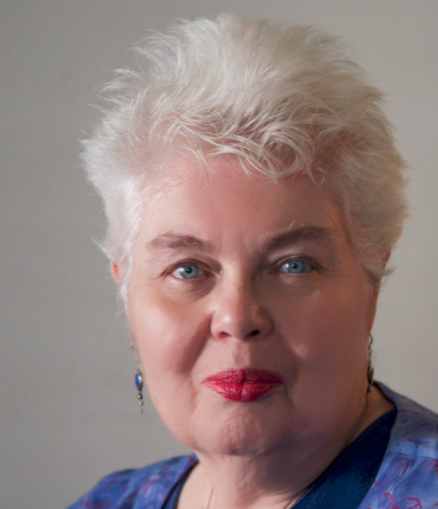
Sue Davis was a leader in the National Writers Union for over two decades.
Mary Kaessinger, New York
I remember Sue as a stalwart figure in the developing women’s movement. YAWF women put out a monthly magazine with the great title “Battle Acts.” With her editing skills, she played a big part in that effort. On Aug. 10, 1970, a group of about 100 women got into the Statue of Liberty and slept inside it overnight. The next morning, a huge banner was draped across the statue’s torso with the women’s symbol and “Women of the World Unite” written in large letters. Sue helped organize this action and joined it. It helped to publicize the Aug. 26 strike, when 50,000 women demonstrated in New York City for equal rights.
Ted Kelly, Philadelphia
Sue was such a helpful and encouraging comrade and was very generous with her time. I remember shortly after we all went into quarantine, she called me to ask about an article of mine she was editing. We ended up speaking for over an hour.
Judith Cashin Lerma, San Antonio
Through the Workers World Supporter Program, Sue and I corresponded via mail and email for almost 20 years. I always appreciated her insight and encouragement. Although we never met face to face, I felt like we were old friends. I will miss her.
Alex Majumdar, New York
Sue Davis was such a consistent presence in the struggle for decades, even if much of it, during the time I knew her, “behind the scenes.” I had the chance to work with her closely on producing a few pamphlets. It was a pleasure. Sue Davis, ¡presente!
Joan Marquardt, San Francisco
The way to honor the leadership of Sue Davis would be to sign up for the Supporter Program and think of her when you send in your monthly pledges.
Janet Mayes, New York City
I met Sue in the early 1990s but didn’t really get to know her until she invited me to join a prose writing class. We drove weekly upstate to the class and had long talks in the car. We grew each other up as fiction writers, and she grew me up politically. We celebrated our birthdays together, participated in readings of our books (which we helped each other self-publish), and shared our love of opera, food and wine. All somehow fit in around her dedicated party work. She assisted physically and emotionally, for days at a time, frightened young women who travelled to New York City for abortions.
Mary Owen, New York
I’ve known and worked with Comrade Sue Davis ever since 1974. Her energy and enthusiasm for struggle have been an inspiration — as has her unique fashion sense. Since 2001 I worked with Sue in the National Writers Union, where she was active in the book division, and for a time edited the union’s newsletter, “Between the Lines.” As grievance chair, she won back payments from publishers for many freelance writers. She also organized Writers for Mumia events several years running. All of this on top of her regular party work on WW newspaper and the Supporter Program. Comrade Sue will be deeply missed, but her intransigent spirit lives on.
Betsey Piette, Philadelphia
My fond memories of Sue Davis go back to her important contributions when WWP held a Women’s Caucus meeting at conferences in New York. Over the years, Sue remained one of the strongest voices in the party for women’s issues. On a personal note: Whenever I would come to conferences in New York, Sue always made a point of inviting me to have lunch or breakfast with her. I loved these one-on-one opportunities to get to know her better.
Anita Rosenblithe, New York City
Sue’s passing is a great loss for me and thousands of others who have been touched by her writing, activism and kindness. She worked tirelessly to create a “Workers World,” both as a columnist for Workers World newspaper and as the coordinator of the paper’s Supporter Program. Her frequent letters to supporters were always insightful and incredibly motivating.
Gloria Rubac, Houston
I learned a lot from the National Writers Union about an aspect of Sue’s life that was such a part of her. She made a progressive, revolutionary contribution that affected more than us in the Party. Her energy and her work ethic is something all comrades should emulate. What a special comrade. She dedicated her entire life to the struggle and to the party. She always had the most wonderful compliments and support for the comrades. Her passion for the women’s struggle and the fight to smash patriarchy should never be forgotten.
Anne Teicher, New York City
In addition to Sue’s organizing and writing, she worked with women from states that did not fund Medicaid abortions and who were forced to travel to New York to find safe health care. The National Network of Abortion Funds — to which Sue donated — subsidizes travel expenses through the Haven Coalition. Sue was one of many volunteers who supported the women with housing, food, accompanying them and providing companionship to help them through the process, up until her final days. She did it with whole heart and her many talents.
We became close friends through our joint work, and eventually, opera and theater buddies. I will miss her comradeship as well as those wonderful evenings of sharing a soaring aria or a moving theatrical moment. She contributed so much to so many and left her mark.
Workers World Party – Central Gulf Coast
We remember and honor comrade Sue Davis, a lifelong Marxist revolutionary, feminist, LGBTQ advocate, and organizer in the struggle for over 50 years. At a rally we held (all of us wearing masks) on Oct. 1 in Pensacola, Fla., the Central Gulf Coast branch of WWP held a moment of silence for comrade Sue Davis, as well as Elandria Williams, a co-founder of Black Lives Matter/ Knoxville, who passed away just days before Sue. Sue was a powerhouse organizer and we must carry on her revolutionary spirit as we move forward in the fight for socialism! In the spirit of Sue Davis, we send revolutionary love.
Edward Yudelovich, New York
I was away from the Party for many years due to my increased job and elder care responsibilities for my parents, especially my father. One day, before I made my WWP comeback, I was walking on the sidewalk and someone was yelling my name. It was Sue. She said, “Don’t you remember what that yell is? It’s the YAWF yell at demonstrations.” We were both active members of the youth group of WWP, YAWF. To Sue, part of being in WWP is that every comrade should be cherished in how they are treated.

